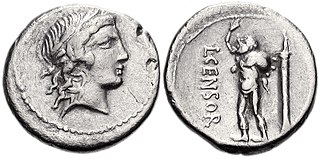
Antonia the Elder was a niece of the first Roman emperor, Augustus, being the eldest daughter of Octavia the Younger and her second husband, the Triumvir Mark Antony. She married Lucius Domitius Ahenobarbus and became the paternal grandmother of the emperor Nero.

Atia was the niece of Julius Caesar, and mother of Gaius Octavius, who became the Emperor Augustus. Through her daughter Octavia, she was also the great-grandmother of Germanicus and his brother, emperor Claudius.
Marcus Atius Balbus was a 1st-century BC Roman who served as a praetor in 62 BC; he was a cousin of the general Pompey on his mother's side and a brother-in-law of the Dictator Julius Caesar through his marriage to Caesar's sister Julia Minor. Through his daughter, Atia, he became the maternal grandfather of Augustus the first Roman Emperor.

The gens Marcia, occasionally written Martia, was one of the oldest and noblest houses at ancient Rome. They claimed descent from the second and fourth Roman Kings, and the first of the Marcii appearing in the history of the Republic would seem to have been patrician; but all of the families of the Marcii known in the later Republic were plebeian. The first to obtain the consulship was Gaius Marcius Rutilus in 357 BC, only a few years after the passage of the lex Licinia Sextia opened this office to the plebeians.
Octavia the Elder was the daughter of the Roman governor and senator Gaius Octavius by his first wife, Ancharia. She was the elder half-sister to Octavia the Younger and Roman Emperor Augustus.

Julia Minor was the second of two daughters of Gaius Julius Caesar and Aurelia. She was an elder sister of the dictator Julius Caesar, and the maternal grandmother of Rome's first emperor Augustus.

Lucius Volusius Saturninus was a Roman senator from the powerful plebeian Volusia gens, or family. He held several offices in the emperor's service. Saturninus attracted the attention of his contemporaries for his long life: he died at the age of 93, and having sired a son at the age of 62.
Marcus Plautius Silvanus was a Roman politician and general active during the Principate. He was consul in 2 BC as the colleague of the emperor Augustus.
Claudia Marcella Minor (PIR2 C 1103, born some time before 39 BC) was a niece of the first Roman emperor Augustus. She was the second surviving daughter of the emperor's sister Octavia the Younger and her first husband Gaius Claudius Marcellus. Marcella had many children by several husbands, and through her son Marcus Valerius Messalla Barbatus she became the grandmother of the empress Messalina.

Marcius Censorinus was a name used by a branch of the plebeian gens Marcia of ancient Rome. The cognomen Censorinus was acquired through Gaius Marcius Rutilus, the first plebeian censor, whose son used it. The gens Marcia claimed descent from both Ancus Marcius, a king of Rome, and symbolically from Marsyas the satyr, who was associated with free speech and political liberty; see further discussion at Prophecy and free speech at Rome. The Marcii Censorini were consistent populares, supporting Marius, Cinna, Julius Caesar, and Antonius.
Gaius Calvisius Sabinus was a consul of the Roman Republic in 39 BC under the Second Triumvirate. He and his consular colleague Lucius Marcius Censorinus had been the only two senators who tried to defend Julius Caesar when his assassins struck on 15 March 44 BC, and their consulship under the triumvirate is taken as a recognition of their loyalty. An inscription, described by Ronald Syme as "one of the most remarkable inscriptions ever set up in honour of a Roman senator," praises Calvisius for pietas, his sense of duty or devotion. As a military officer, Calvisius is notable for his long service and competence, though he was not without serious defeats.
Lucius Marcius Censorinus was a consul of the Roman Republic in 39 BC, during the Second Triumvirate. He and his colleague Gaius Calvisius Sabinus had been the only two senators who tried to defend Julius Caesar when he was assassinated on the Ides of March in 44 BC, and their consulship under the triumvirate was a recognition of their loyalty.

Lucius Marcius Philippus was a Roman politician who was elected suffect consul in 38 BC. He was step-brother to the future emperor Augustus, as well as his uncle

Gaius Antistius Vetus was a Roman senator active during the early Roman Empire, and a consul in 6 BC as the colleague of Decimus Laelius Balbus.
Gaius Fufius Geminus was an imperial Roman senator who was appointed suffect consul for the period September-October 2 BC, as the colleague of Lucius Caninius Gallus.
Gaius Sentius Saturninus was a Roman senator and military officer who was appointed Roman consul in 19 BC. He served as the proconsular governor of Africa, and later as imperial governor of Syria. He then served several times as a senior military officer working with the future emperor Tiberius in campaigns against the Marcomanni, gaining the distinction of being awarded triumphal ornaments. Later he campaigned in Germania and Illyria.
Lucius Caninius Gallus was a Roman senator who was appointed suffect consul in 2 BC.
Sextus Nonius Quinctilianus was a Roman Senator. He was appointed consul in AD 8 as the colleague of Marcus Furius Camillus.
Marcus Appuleius was a nephew of the Roman emperor Augustus and Roman consul in 20 BC with Publius Silius Nerva as his colleague.
Vipsania was an ancient Roman noblewoman of the first century BC. She was married to the orator Quintus Haterius and was likely the daughter of Roman general Marcus Vipsanius Agrippa and his first wife Pomponia Caecilia Attica.








